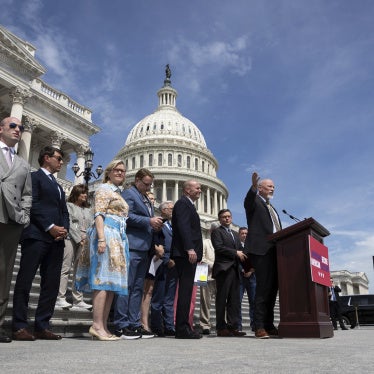Pentagon officials recently signaled a shift in U.S. policy on Afghanistan, admitting that an expansion of international peacekeeping operations beyond Kabul is necessary. The unsuccessful attempt to assassinate President Hamid Karzai on Thursday in Kandahar is intensifying calls for such a move. Some in the Bush administration called it a "mid-course correction," but the United States appears to be on the verge of a major U-turn.
For months, Defense Secretary Donald Rumsfeld and Deputy Secretary Paul Wolfowitz have resisted calls for an expansion of ISAF, the International Security Assistance Force, composed of 4,500 troops from 19 states and headed by Turkey. But as insecurity, factional fighting among warlords, and lawlessness have continued, it has become clear that waiting years for the formation of a credible national Afghan army and police force is not the answer.
"We do not oppose ISAF expansion" beyond Kabul, Wolfowitz said Thursday, while calling on the international community to take a greater role. General Tommy Franks, head of the U.S. command in Afghanistan, said there were "a number of places that would indicate the desirability of expanding the ISAF." Karzai himself, the United Nations secretary-general Kofi Annan, and members of the U.S. Congress in both parties have been urging expansion of the peacekeeping force.
As long as security outside of Kabul is in the hands of warlords, Afghans will not be secure. And as long as the Kabul government is dependent on regional warlords, its legitimacy will be open to question. Greater security throughout the country is a prerequisite for rebuilding devastated infrastructure, encouraging the re- emergence of Afghan civil society, and establishing legal and administrative institutions to protect the rights of all Afghans. A field presence of international peacekeepers will encourage compliance with disarmament and demilitarization agreements.
Factional rivalry in northern Afghanistan has led to a rise in attacks on humanitarian aid workers and Afghan civilians, threatening the delivery of urgently needed aid and resettlement assistance. Ethnic Pashtuns, a minority in the north, have been subject to targeted violence including rape, seizure of farmland, and demands for money by local commanders.
Wolfowitz visited Mazar-i-Sharif in July and expressed alarm over the violence as an obstacle to development, but gave backing to the local warlords whose forces are responsible for many of the abuses in the north. Ironically, by relying on warlords and opposing an expansion of the peacekeeping force, the United States has allowed the situation to become more, not less, unstable.
Other parts of the country are also plagued by violence, affecting Afghan women, ethnic minorities, and returning refugees. In several areas around Herat in the west, and Kandahar in the south, minorities have been harassed by local forces. On most roads between major cities, armed groups regularly extort money from farmers, traders and anyone not under the "protection" of a regional strongman.
The Bonn agreement provided for an international peacekeeping force in Kabul, but also indicated that such a force "could, as appropriate, be progressively expanded to other urban centers and other areas." The UN Security Council, which renewed the peacekeepers' mandate in May, will need to vote to redefine its mandate, while seeking contributions troops, funding, and logistical support from member states to gradually increase its scope.
The United States should immediately take the lead in drafting a Security Council resolution, seeking support from European governments and others on the Council. President George W. Bush, when he speaks at the United Nations on Sept. 12, should publicly endorse expansion of the peacekeeping force. Secretary of State Colin Powell should consult closely with Afghan leaders and UN officials to devise a workable strategy for increasing security.
Certainly, the U.S. Congress can also help. The administration should support legislation adopted by the Senate Foreign Relations Committee on Aug.1, authorizing $1 billion over two years for more peacekeepers, then work with Congress to get the necessary funds appropriated. During his visit to Afghanistan, Wolfowitz said that Washington is committed to Afghanistan's reconstruction, declaring that the U.S. had learned a lesson from 10 years of benign neglect.
It's now up to the Bush administration to make good on that promise, not only by giving aid, but also by doing more to create the security conditions needed for a peaceful, stable Afghanistan to emerge.
Mike Jendrzejczyk is Washington D.C. Director of Human Rights Watch's Asia Division.






